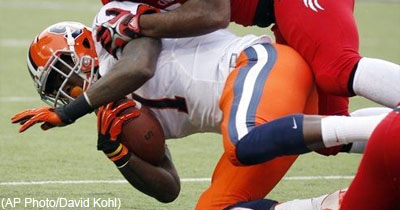
In the wee hours of April 8th, 2003 I sat in the corner of The Sports Cafe, just down the street from Piccadilly Circus, and cried. They were tears of relief—the emotional manifestation not just of Syracuse basketball winning their first ever National Championship, but also having avoided the type of kick-me-in-the-crotch loss I was dreading. Friends ran up to me, tried to hug me, to celebrate with me, but I wouldn’t let them.

This was my moment and I didn’t intend to share it with them. These were the same people who were noticeably absent from the Carrier Dome a year earlier when Syracuse was playing in the Final Four… of the NIT. I didn’t think these “fair-weather fans” could appreciate the significance of Syracuse’s victory on the same level as me, that I was a “better fan.” But what did being a “better fan” get me? Certainly not more happiness, I was the least happy Orange fan in that whole bar. No, being a “better fan” didn’t get me anything, except for some strange looks from my friends as they watched a lunatic ugly cry.
As I sat through Saturday’s disgusting football game between Syracuse and Cincinnati, I found myself asking, “Why I am subjecting myself to this misery?!” Sports are supposed to be fun, but I almost never enjoy Syracuse football games, even when we win. I have to go back to the days of McNabb to remember the last time I truly did. So why not put the emotional investment I’ve made in this (awful) team on hold until they’re at least half-way decent again? Why not become a fair-weather fan myself?
» More from Nate Federman: What SU can learn from Chip Kelly
Amongst die-hard sports fans, there’s a stigma against being a fair-weather fan. “Their love of the game is less than mine.” Yes, that’s probably true, but so what?! From a purely rational standpoint, one that takes into account a cost-benefit analysis of the return on one’s emotional, physical, and financial investment in a sports team, you’d have to be completely irrational to be a die-hard fan. The mathematics of sports are pretty clear and they ensure your favorite isn’t going to win the championship most of the time. Which means, if you’re a die-hard fan, you’re going to finish the season disappointed most of the time. So is sports fandom a purely irrational enterprise? Quite the contrary actually.
If you invest enough time in sports, a person will generally be rewarded by getting to watch a moment that seems to defy physics, a transcendent performance, and/or greatness. Whether you were a Syracuse fan or not, our six overtime victory against UCONN was a game anyone who watched will never forget. The same goes for Lebron’s performance in last year’s NBA finals or watching the creativity and finesse of Spain’s national team in the World Cup two years ago. Those rare moments of greatness are beautiful and exciting, the kind of moments that any and every fan can appreciate. The kind you kick yourself if you miss. So clearly there’s a rational explanation for watching sports, but watching sports is different than actually investing in a team.
Now there’s a rational explanation for being a fan too. Being a fan offers an individual many of the same benefits organized religion offers its followers. To love a team means being a part of a community, a shared experience and passion that unites those who might otherwise have nothing in common. The stakes and excitement of the game are a distraction from the monotony of one’s day to day existence. It’s an opportunity to be a part of something bigger and more important than you, to be a part of greatness. And that’s why sports are a religion for so many people.
» More SU football: Syracuse sloppy in loss to Cincinnati
So I understand why people watch sports and I understand why people root for teams, I’m just not sure why people root for bad teams. If you’re a student at a University or live in a community (like Syracuse) where you have the opportunity to go to games, there’s something to be said for the shared experience of cheering on your team with thousands of other like-minded fans, but I watch Syracuse games in Los Angeles, generally by myself, so why shouldn’t I be a fair-weather fan?
The common belief is that by going through the bad, a fan appreciates the good that much more (if the good ever happens). But this seems to be largely false, at least in my experience. The fair-weather fans at Syracuse seemed to enjoy our National Championship even more than I did. Perhaps I appreciated it more, but in a cost-benefit analysis, what good is appreciation if it doesn’t lead to additional enjoyment? Take the Boston Red Sox’s epic World Series victory in 2004—while many would say that the 86 year gap in between championships made Red Sox fans appreciate the title so much more, every fair-weather Red Sox fan I came across (and there were many) seemed to enjoy the championship just as much (if not more) than the die-hard ‘Sox fans I knew. Hopping on the bandwagon late doesn’t preclude someone from experiencing the highs of victory, it just shields them from the lows of defeat.
Another popular belief is there’s something honorable about sticking with a team through thick and thin. Now, as a guy who has never cheated on a girl or a sports team I support, I understand this mindset. Furthermore, there’s something that makes me sick to my stomach when I see people switch allegiances to whichever team happens to be good at the moment. It feels like cheating and it’s not for me, but I can’t find a rational argument for why it’s bad.
» Are you a fair-weather fan? Leave your comment below
If you have the mental ability to jump into bed with whatever team is hot and actually enjoy yourself, you’re going to have a good time watching sports a lot more often. The same seems to hold true if you’re a life-long fan of a team, but only become emotionally invested in your team when they’re good. What does the loyalty of being a die-hard fan get you when your team sucks, aside from kudos from other (bitter) die-hard fans? A misplaced sense of pride, and a lot of frustration and agony.
So while I understand why people watch sports and why they become invested in sports teams, it suffices to say there are better, less emotionally dysfunctional ways of being a part of a community and and adding excitement to our lives. There simply doesn’t seem to be any rational reason to blindly love and invest in a sports team that makes you miserable. It makes much more sense to wait for that team to be good enough to warrant your emotional investment. So when a bad Syracuse team plays an undefeated (but mediocre) Louisville team next week, will I watch a game I know I shouldn’t? Probably, yeah. I’m not a fair-weather fan, but I wish I could be.
For more Syracuse coverage, Like our Facebook page and follow us @TheJuiceOnline.
